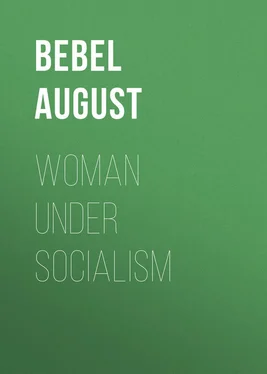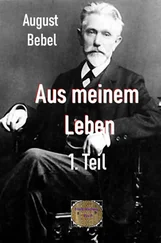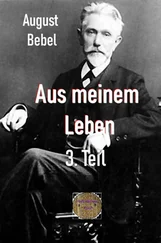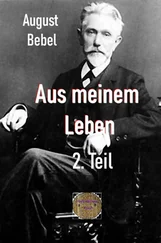August Bebel - Woman under socialism
Здесь есть возможность читать онлайн «August Bebel - Woman under socialism» — ознакомительный отрывок электронной книги совершенно бесплатно, а после прочтения отрывка купить полную версию. В некоторых случаях можно слушать аудио, скачать через торрент в формате fb2 и присутствует краткое содержание. ISBN: , Жанр: foreign_antique, foreign_prose, на английском языке. Описание произведения, (предисловие) а так же отзывы посетителей доступны на портале библиотеки ЛибКат.
- Название:Woman under socialism
- Автор:
- Жанр:
- Год:неизвестен
- ISBN:http://www.gutenberg.org/ebooks/30646
- Рейтинг книги:5 / 5. Голосов: 1
-
Избранное:Добавить в избранное
- Отзывы:
-
Ваша оценка:
- 100
- 1
- 2
- 3
- 4
- 5
Woman under socialism: краткое содержание, описание и аннотация
Предлагаем к чтению аннотацию, описание, краткое содержание или предисловие (зависит от того, что написал сам автор книги «Woman under socialism»). Если вы не нашли необходимую информацию о книге — напишите в комментариях, мы постараемся отыскать её.
Woman under socialism — читать онлайн ознакомительный отрывок
Ниже представлен текст книги, разбитый по страницам. Система сохранения места последней прочитанной страницы, позволяет с удобством читать онлайн бесплатно книгу «Woman under socialism», без необходимости каждый раз заново искать на чём Вы остановились. Поставьте закладку, и сможете в любой момент перейти на страницу, на которой закончили чтение.
Интервал:
Закладка:
By means of these expositions – especially as clearly and lucidly presented by Frederick Engels, in his support of Morgan's excellent and fundamental work, – a mass of light is shed upon hitherto unintelligible, partly seemingly contradictory phenomena in the life of the races and tribes of both high and low degree of culture. Only now do we gain an insight into the structure that human society raised in the course of time. According thereto, our former views of marriage, the family, the community, the State, rested upon notions that were wholly false; so false that they turn out to be no better than a fancy-picture, wholly devoid of foundation in fact.
All that is said and proved about marriage, the family, the community and the State holds good especially with regard to woman, who, in the various periods of development did likewise fill a place, that differs materially from the "eternal," imputed to her.
Morgan, whom Engels agrees with in this, divides the history of mankind into three main epochs: – savagery, barbarism and civilization. Each of the two first ones he again divides into an under, a middle and an upper period, each distinguishing itself from the other by certain innovations and improvements, predicated in each instance upon the control over subsistence. Morgan, accordingly, exactly in the sense of the materialist conception of history, as established by Karl Marx and Frederick Engels, – perceives the leading characteristics in the development of society to be the changes that, in given epochs, the conditions of life are molded into; and he perceives the changes to be due to the progress made in the process of production, that is to say, in the procurement of subsistence. Summed up in a few words, the lower period of savagery constitutes the infancy of the human race, during which the race, partly living in trees, is mainly nourished by fruits and roots, and during which articulate language takes its inception. The middle period of savagery commences with the acquisition of a fish subsistence, and the use of fire. The construction of weapons begins; at first the club and spear, fashioned out of wood and stone. Thereby also begins the chase, and probably also war with contiguous hordes for the sources of food, for domiciles and hunting grounds. At this stage appears also cannibalism, still practiced to-day by some tribes and peoples of Africa, Australia and Polynesia. The upper period of savagery is characterized by the perfection of weapons to the point of the bow and arrow; finger weaving, the making of baskets out of filaments of bark, the fashioning of sharpened stone tools have here their start, and thereby begins also the preparation of wood for the building of boats and huts. The form of life has accordingly, become many-sided. The existing tools and implements, needed for the control of a plentiful food supply, make possible the subsistance of larger communities.
The lower period of barbarism Morgan starts with the invention of the art of pottery. The taming and domestication of animals, and, along with that, the production of meat and milk, and the preparation of hides, horns and hair for various purposes of use, have here their start. Hand in hand therewith begins the cultivation of plants, – in the West of maize, in the East of almost all known cereals, maize excepted. The middle period of barbarism shows us, in the East, the ever more extensive domestication of animals; in the West, the cultivation of maize and plants by irrigation. Here also begins the use of adobe-bricks and of stone for house-building. The domestication of animals promotes the rearing of herds, and leads to the pastoral life. The necessity of larger quantities of food for men and beasts leads to field agriculture. Along therewith, the people begin to be localized; food increases in quantity and diversity, and gradually cannibalism disappears.
The upper period of barbarism begins finally with the smelting of iron ore, and the discovery of the phonetic alphabet. The iron plow-share is invented, making possible agriculture on a larger scale; the iron axe and spade are brought into requisition, making easy the clearing of the forests. With the preparation of iron, a number of fields are opened to activity, imparting to life a new form. Iron utensils help the building of houses, vessels and weapons; with the preparation of metals arises skilled handwork, a more perfect knowledge of weapons, and the building of walled cities. Architecture, as an art, then rises; mythology, poetry and history find support and expansion in the discovery of the phonetic alphabet.
The Orient and the countries bordering on the Mediterranean, particularly Egypt, Greece and Italy, are those in which the last sketched stage of life principally unfolded; and it laid the foundation for the social transformation that in the course of time exercised a determining influence on the social development of Europe and of the whole earth.
As a matter of course, the social development of the human race through the periods of savagery and barbarism had also its peculiar sexual and social relations, differing materially from those of later days.
Bachofen and Morgan have traced these relations by means of thorough investigations. Bachofen, by studying closely all ancient and modern writings, so as to arrive at the nature of phenomena that appear singular to us in mythology, folk-lore and historic tradition, and that, nevertheless, seem to be re-echoed in incidents and events of later days, occasionally even of our own. Morgan, by spending decades of his life among the Iroquois Indians, located in the State of New York, and thereby making observations, through which he gained new and unexpected insight into the system of life, the family and the relationships of the said Indian tribe, and, based upon which, observations made elsewhere, first received their correct interpretation and explanation.
Both of them, Bachofen and Morgan, discovered, each along his own line of research, the latter, however, far more clearly than the former, that the relations of the sexes during primitive times of human development were substantially different from the relations existing in historic days, and among the modern civilized peoples. Especially did Morgan discover – thanks to his many years' sojourn among the Iroquois of North America, and grounded upon comparative studies, which he was moved to by that which he there observed, – that all the existing races, that are still materially backward, possess systems of family and consanguinity that are totally different from ours, but must be similar to those once prevalent among all races during the previous stages of civilization.
Morgan found, at the time that he lived among the Iroquois, that among them there existed a system of monogamy, easily dissolvable by both parties, and which he designated as the "pairing family." He also found that the terms for the degrees of consanguinity – father, mother, son, daughter, brother, sister – although, according to our conception, there can be no doubt as to their application, were there, nevertheless, applied in quite different sense. The Iroquois calls not only his own children "sons" and "daughters," but also the children of all his brothers; and their children call him "father." Conversely, the female Iroquois calls not only her own children "sons" and "daughters," but all those of her sisters, and likewise do their children call her "mother." On the other hand, she calls the children of her brothers "nephews" and "nieces," and these call her "aunt." The children of brothers call one another "brothers" and "sisters;" likewise the children of sisters. Finally, the children of a woman and those of her brother call one another "cousins." Accordingly, the singular spectacle is seen of the terms of relationship going, not as in our sense, by the degree of consanguinity, but by the sex of the relative.
Читать дальшеИнтервал:
Закладка:
Похожие книги на «Woman under socialism»
Представляем Вашему вниманию похожие книги на «Woman under socialism» списком для выбора. Мы отобрали схожую по названию и смыслу литературу в надежде предоставить читателям больше вариантов отыскать новые, интересные, ещё непрочитанные произведения.
Обсуждение, отзывы о книге «Woman under socialism» и просто собственные мнения читателей. Оставьте ваши комментарии, напишите, что Вы думаете о произведении, его смысле или главных героях. Укажите что конкретно понравилось, а что нет, и почему Вы так считаете.












